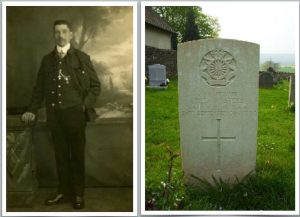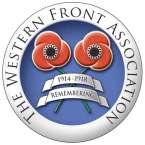10th Divisional Company, Army Cyclist Corps

In the space of under five years Fred Masters experienced a spell in prison, Gallipoli, Egypt and civilian life before his untimely death at the age of 23.
Fred Masters was born on 13 March 1893 at Great Rissington (and baptised on the 7th of May that year). His parents were William Masters (1852-1923) who was an agricultural worker and his wife Clara (née Taylor: 1857-1932). He was one of four children, two girls and two boys.
In 1901 the family lived in Great Rissington and by 1911 Fred had moved from the family home to board with a family at nearby Little Barrington, where aged 18, he was a waggoner on a farm. It was whilst living at Little Barrington that he fell foul of the law. In November of that year he had sexual relations with a daughter of the household, who happened to be just short of her fourteenth birthday.
The affair came to light and as she was under sixteen years of age, he was summonsed to appear before the Petty Sessions at Northleach, where he pleaded not guilty but changed his plea, following referral to Gloucester Assizes on 25 January 1912.
The judge handed down a lenient two month prison sentence with hard labour, taking into account his plea of guilty and the fact that the girl would not have to appear in the witness box.
The trial was reported in several local newspapers. Presumably he did not return to Little Barrington after he had served his time.
Details of his military service have survived in an Army Pension Record. It would appear that he had, at some point, moved to 9 Ferndale, George Street West, Birmingham (somewhere between Hockley and Ladywood) and was employed as a carman (or vehicle driver). He enlisted in the Army, on 5 September 1914, for an initial three years. He quoted his age as 21 years and five months.
His initial posting was to the Duke of Cornwall’s Light Infantry (DCLI) at Bodmin, where he was given the number 14872. His stay with the DCLI proved temporary as, on 18 September, he was transferred to the Royal Irish Fusiliers (and his number changed to 15080). On 1 December 1914 he was on the move again, this time to the Army Cyclist Corps, 10th Division Company.
On 11 July 1915, along with other elements of 10th Division, Fred’s unit, were posted to the Middle East Expeditionary Force (MEF) and arrived at Mudros, the base for operations on the Gallipoli Peninsular.
The Division landed at Suvla Bay, Gallipoli on 6-7 August. According to his Medal Rolls Index Card, Fred did not arrive in Gallipoli until 14 August.
The Army Cyclist Corps (ACC) was established to facilitate message carrying and if necessary, provide infantry support. It was also used to undertake front line tasks, such as fetching and carrying and fatigues etc.
Examination of the 10th Company’s War Diary indicates that during August 1915, its personnel were undertaking the latter. The entry for 31 August 1915 reads as follows: “French aeroplane had landed this morning. Enemy fired about 160 shells at it without causing any serious damage. Caused fires which endangered the wires connecting 10 Div. plus 30th Infantry Brigade plus 10th Cyclist Company. Coy. went out to save wires: insulation burnt but communication maintained despite constant shelling. 1 Officer slightly wounded by shrapnel: 3 men wounded”
It is believed that Private Fred Masters was one of the three wounded and he had been wounded by shrapnel in his left arm and right thigh.
On 4 September he was admitted to 14 Casualty Clearing Station and transferred to hospital at Base (presumably on Mudros). On 11 September he was admitted to the Citadel Military Hospital in Cairo and on 29 October 1915 invalided back to England on the Hospital Ship Asturias.
On arrival in England he was admitted to the 2nd Western General Hospital, Manchester on 8 November 1915 and placed on the strength of the ACC Training Centre.
A medical board convened on 19 May 1916 noted that, as a result of his wounding in Gallipoli, he was unable to flex his left elbow properly, his wrist and fingers were very stiff and there was muscle wasting in his shoulder.
He was discharged from the Army on 6 June 1916 as ‘no longer physically fit for war service’.
Unusually he does not appear to have been issued with a Silver War Badge, to denote previous military service. He had served for one year and 275 days.
It would appear that following discharge he returned to civilian life in Birmingham but he died on 26 September 1916, aged 23, in the King’s Norton district.
The Cheltenham Chronicle of 7 October 1916 carried the following report of his funeral:
“Private Fred Masters was interred at the new burial ground (Great Rissington) on Saturday
30 September 1916. He had enlisted in the early days of the war and fought in the Dardanelles, being wounded in August 1915. In 1916 he had so far recovered that, although greatly disabled in the left arm, he went top Birmingham, taking up a position of clerk. Suddenly, however, he developed an abscess and died. He was brought home from the city and buried in Great Rissington, his native village.”
Although Private Fred Masters is considered to have died of wounds, there is no obvious connection between the disablement of his left arm and the cause of death, as stated in the newspaper. A recently released Pension Record Card gives the cause of death as pneumonia.
Possibly there was an underlying infection from his wounding, which, in the days before antibiotics, would have been difficult to eradicate.
Private Fred Masters grave in the churchyard of St John the Baptist, Great Rissington is marked by a standard CWGC headstone. His name features on the Great War Memorial inside the church, along with those of the five Souls brother, from the village, who died during the war.
Researched by Graham Adams 16 May 2021 with acknowledgement to the Private Members Tree on Ancestry for the photograph)
